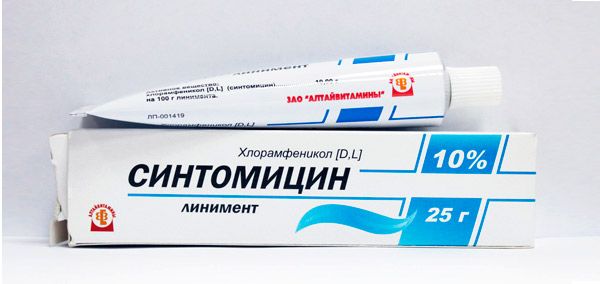Medical expert of the article
New publications
Preparations
Syntomycin ointment for acne
Last reviewed: 03.07.2025

All iLive content is medically reviewed or fact checked to ensure as much factual accuracy as possible.
We have strict sourcing guidelines and only link to reputable media sites, academic research institutions and, whenever possible, medically peer reviewed studies. Note that the numbers in parentheses ([1], [2], etc.) are clickable links to these studies.
If you feel that any of our content is inaccurate, out-of-date, or otherwise questionable, please select it and press Ctrl + Enter.

Acne on the skin can appear not only in teenagers. Such unpleasant formations bother people of all ages. The way out of this situation will be Syntomycin ointment, which has proven itself as an effective and easily accessible remedy, no worse than expensive advertised drugs that help in the fight against various types of inflammation on the skin.
Does syntomycin ointment help with acne?
Syntomycin ointment is an effective method in the fight against acne, boils and similar inflammations. What is the reason for its effectiveness? Firstly, the ointment contains a potent antibiotic, levomycetin. It eradicates bacteria and microorganisms that provoke the inflammatory process. The main component is chloramphenicol, which prevents the proliferation of harmful microbes. Secondly, castor oil, which has an anti-inflammatory and antiseptic effect. Thanks to it, the skin does not dry out when using the ointment and at the same time becomes lighter. Thus, Syntomycin ointment will help not only to end acne, but also to fight any infection that has a negative effect on the human skin.
Read also:
Indications for use
Syntomycin ointment is recommended for the treatment of many disorders. The most common ones include furunculosis, shingles, impetigo, burn wounds, inflammation of the sweat glands, pustular lesions of the skin and mucous membranes, and trachoma.
Synthomycin ointment for acne scars
Another unique property of Syntomycin ointment, which has determined its popularity, is the ability to eliminate spots that remain in the place where acne used to be. This effect is possible thanks to castor oil. It normalizes the process of pigment cell production, provokes active renewal of the epidermis, which prevents scarring and the appearance of scars.
Pharmacodynamics and pharmacokinetics
Chloramphenicol penetrates the epidermis and destroys the cell membrane of harmful microorganisms, disrupting the process of protein synthesis in them. It stops the growth of bacteria and microbes, and leads to their death.
Since Synthomycin ointment is used externally and in small quantities, the degree of systemic absorption is insignificant.
Method of application and dosage of syntomycin ointment for acne
Before applying the product to the skin, the area should be cleaned and left to dry. Then, using a cotton swab or fingertip, carefully apply Synthomycin ointment to the pimple so as not to provoke additional painful sensations.

Cover with a bandage or bactericidal plaster on top. The course of treatment lasts ten days. After the problem is eliminated, stop using the ointment. Since it is part of the antibiotic group, the dosage and duration of treatment are determined by the doctor.
Use during pregnancy
Medical studies have shown that the active ingredients in Syntomycin ointment can penetrate the placenta, but how they directly affect the fetus has not been determined. Therefore, doctors, in order to avoid negative consequences, do not recommend using this product during pregnancy. Its use is permissible only in extreme cases, and under the strict supervision of a specialist.
Contraindications for use
It should be taken into account that there are a number of restrictions in the use of Syntomycin ointment. It is contraindicated for pregnant women and newborn children. It is not recommended for people with individual intolerance to the components, with disorders of hematopoietic processes, with liver disease. If a tumor is diagnosed, there are various skin diseases, open wounds and purulent discharge.
Side effects
Despite the excellent result of Syntomycin ointment, its use may be accompanied by side effects. Which manifest themselves in the form of an allergic reaction, itching, redness, swelling. The development of repeated fungal pathologies of the skin and mucous membranes is possible. In this case, it is necessary to immediately stop using the drug.
Overdose
In case of an overdose of Syntomycin ointment, the manifestation of side effects of the drug may increase.
Interactions with other drugs
Syntomycin ointment is not prescribed with barbiturates, ethanol, cytostatics, pyrazolone derivatives, diphenyl. The effect of the liniment is increased by nystatin, erythromycin, levorin, oleandomycin, and inhibited by benzylpenicin salts. The drug is incompatible with sulfonamides.
Storage conditions
Store in a closed package, in a dry place, at a maximum temperature of + 15 degrees. Do not freeze.
Best before date
Two years. After the expiration date, it is better to stop using the drug.
Attention!
To simplify the perception of information, this instruction for use of the drug "Syntomycin ointment for acne" translated and presented in a special form on the basis of the official instructions for medical use of the drug. Before use read the annotation that came directly to medicines.
Description provided for informational purposes and is not a guide to self-healing. The need for this drug, the purpose of the treatment regimen, methods and dose of the drug is determined solely by the attending physician. Self-medication is dangerous for your health.

